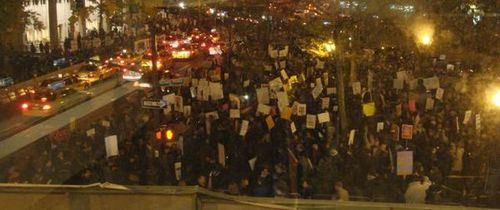It's been a while since I gave my stump speech on marriage equality. In the 1990s, I must have given it hundreds of times. It was a much lonelier struggle back then, which is why it is so moving to see how this profound cause has now burgeoned into a mass movement worthy of it. At one moment, in one speech, I tried to explain to a frustrated audience member why the institution of marriage matters to us gay people, and why nothing else will ever do. It came out something like this:
Growing up gay in a largely straight world, and being told that you can have your legal contracts for your relationship if you're lucky, or live with domestic partnerships if you're really lucky, is a bit like growing up in a big, old house. You're allowed to live there - in fact, you were born there and grew up there - but certain rooms are off-limits. "You can't go in there," the adults say, as soon as you learn to walk. "Or there," they remind you as you get older. And you wonder why. But you're a good kid and don't want to make a ruckus, and it's your home too and your family, and they seem very insistent. After a while, they allow you to go up to the second floor and even third floor. There are rules there: don't touch that vase, don't put your feet on that couch, don't spill anything on that rug. But you can still hang out there if you really want to.
But there's one room at the very top of the house that has always been forbidden, and the more lee-way you are given elsewhere, the more stringently that rule is enforced. In the end, they say, "You can go anywhere and do anything - apart from that room." And you accept this, because they seem so intent on it. And you love them. But you keep wondering: why that room? What is up there? What am I not allowed to experience or to see?
And one day, you get up your courage and you wait till the adults are out and you gingerly make your way to that room you have never been in before.
And you go in, and look around, with some awe and burning curiosity. And you look in the cupboards and the drawers and under the chairs, and finally you find, in one dusty old desk, what they never wanted you to find.
You find the legal papers, the deed, that proves that they own the house. And you don't. However long you live, whatever you do, however you conduct yourself, this house will never be yours. You can live in it - with their permission, and under their authority. It is your home, because where else were you born and where else would you live - but only to rent, never to own. It is your family, but you are always kept one critical step away from being fully part of it. There is one fine line you will never be allowed to cross.
It is your country, but you are never fully a citizen. You can live here, but you can't vote. Your parents can die here, but you will never inherit this house.
We want to be citizens.
We want to be a full and equal part of our own homes and our own families and our own lives.
And some of us, having been in that room for a short while, know what it feels like.
And we will never, ever let it go.
